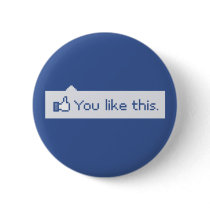Facebook's Push for Intimacy Starts with a Likable Nudge
 It's no mystery that Facebook wants users spending as much time as possible in its ecosystem, so that it can grow its advertising business and gather more super-valuable data about what people are buying. And so far, it has kept users hooked with chat, News Feed and (increasingly) video content. Now there's a fourth element to the allure of Facebook addiction -- the small but significant ability to "Like" any comment -- and it might put to rest one of the oldest complains about the big blue social network. That is, that its "friendships" are meaningless.
It's no mystery that Facebook wants users spending as much time as possible in its ecosystem, so that it can grow its advertising business and gather more super-valuable data about what people are buying. And so far, it has kept users hooked with chat, News Feed and (increasingly) video content. Now there's a fourth element to the allure of Facebook addiction -- the small but significant ability to "Like" any comment -- and it might put to rest one of the oldest complains about the big blue social network. That is, that its "friendships" are meaningless.
Slapping a "Like" button on wall posts and status updates came with the original Like system rollout, but what's new here is the ability to vote up subsequent comments made by other users. It may not seem like much, but Facebook is making this "comment-like" data available to developers, and for good reason: it provides a metric that shows who a given user likes hearing from the most.
This has the ability to affect a sea change in the way users interact with Facebook. For too long, Facebook's primary complaint has been that users' increasingly bloated pools of "friends" have no bearing on their real world relationships. Sure, you have 1,000 friends, but how many do you actually want to hear from?
Now you -- and your friendly neighborhood Facebook app developer -- will know the answer. In a sense, this is Facebook doing its field work; it wants to find out who your "real" friends are, so that it can make them more relevant and push everyone else to the side. While Facebook hasn't said publicly how it will use the comment data, it would make sense if people in your News Feed floated to the top based on how many of their comments you've "liked." ReadWriteWeb does a good job of parsing the technicalities:
Any time a social interaction can be instrumented -- turned into data and made measurable -- that opens up new opportunities for cross referencing it with other data points, for illuminating more connections between people. Imagine being able to see who from your high school gets the most comments liked, or to see a stream of books liked by people whose comments you liked more than once.It also adds nuance to Facebook's understanding of your personal social graph, and that means a lot for things like social buying. If your "friend" pressed the Like button beside a product just a week ago, there was no way Facebook would know whether you shared your friend's taste. Soon, it will be able to rank that person against your other friends, allowing the system to know how relevant that friend's tastes are to you. And that has implications for everything from data mining to targeted advertising.
It also has the added effect of reducing the allure of Twitter, LinkedIn and personal blogging. Twitter has had this kind of granular control since its inception; on that service, you only hear from the people you want to hear from, instead of from everyone in your social graph. Now that Facebook will have the ability to give priority to your real "friends," you may be able to adjust privacy settings so that only your in-crowd sees your most personal comments and posts. That makes the status update a much less confusing tool. To date, some research has shown that people aren't sure what's appropriate content for a status update because of the mixed nature of their "friends." And if you have that kind of granular control of privacy, you won't think twice before adding all your work contacts, making a LinkedIn profile redundant.
Blogging is another area that may suffer. Sure, roughly 95% of blogs are abandoned one-man ghost towns. But social blogs like Tumblr have injected new life into the hobby by allowing bloggers to "follow" each other, reblog content and -- yup -- tick a heart box when they like something. Both Twitter and Tumblr have succeeded by affecting a very small, intimate feedback loop that was heretofore unavailable to Facebook because of its hugeness. No longer.
Related: